As you advance in your career, you’ve got a handle on your role and your best skills. The next step could be a vertical move within your team or even elsewhere in your organization — often that move could land you in project management or program management roles. But wait — what’s the difference? What is the career outlook?
This guide to program management is a good place to start understanding what program managers do, the common requirements and qualifications needed to become one, and three ways to be a great program manager. We’ll also look at how a project management solution like monday.com can help program managers boost productivity.
What makes something a program?
Before we launch into an explanation of what program managers do, let’s first understand what a program is, in an organization.
A program is a group of related projects that help an organization achieve a strategic goal.
A strategic goal could be anything from improving a company’s customer service and enhancing employee engagement to boosting sales. To achieve these objectives, an organization may launch different programs such as implementing a new customer service software, revamping the employee onboarding process, or opening a new retail store.
Each of these programs will include a set of related projects, that a program manager will then handle. Here’s how you might track a program on a monday.com board:
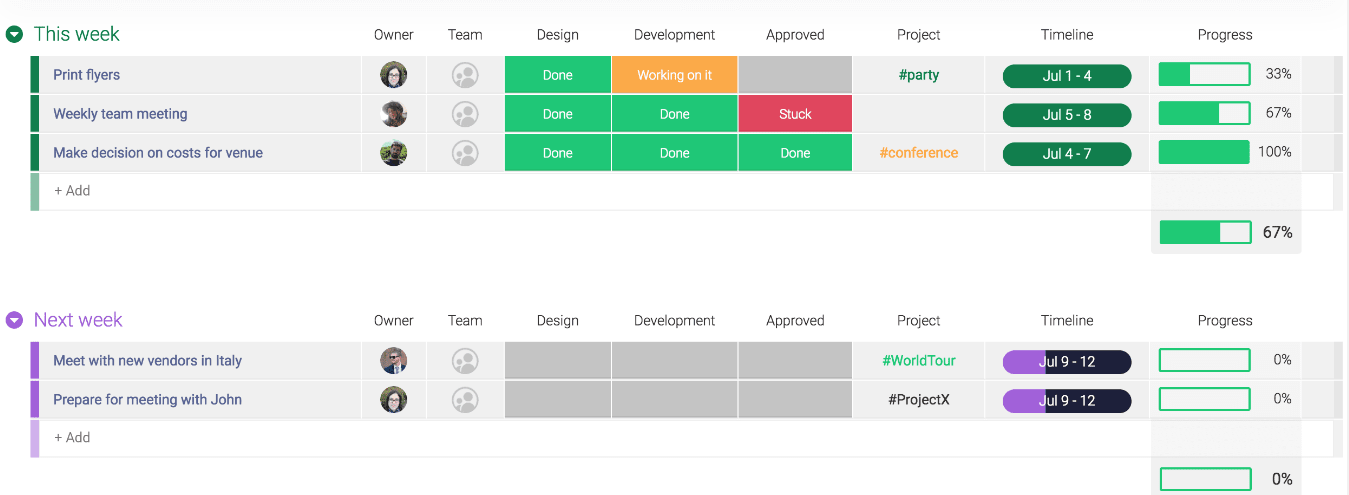
What is program manager?
Program managers essentially oversee the fulfillment of bigger organizational goals. Instead of directly managing multiple projects, they act as facilitators between them.
Specifically, program managers act as:
- Strategic leaders: Setting up high-level plans and initiatives, and providing guidance to project managers
- Coordinators: Facilitating cross-communication between different teams and keeping C-suite leaders informed of a program’s progress
- Analysts: Identifying metrics for a program’s success and tracking and analyzing them on a regular basis
Explaining the difference: program manager vs. project manager
People often use the terms program and project manager interchangeably, when the roles have some core distinctions.
As a recap, program managers do — strategize, coordinate, and manage a group of related projects. Program managers are most concerned with timelines, budget, resource allocation, and reporting for multiple projects. Typically, a program manager might think, “When should project A start, so project B is not delayed?”
On the other hand, a project manager is responsible for planning and implementing a specific project. A project, or a group of tasks and subtasks that must be completed to achieve a specific goal, is usually smaller in scale than a program — which might be made up of several projects. A project manager spends time assigning tasks, and deadlines, and tracking progress at a granular level. They might think about issues like, “What happens if X deliverable is not completed in time?”
Here’s a handy breakdown of the differences between the two:
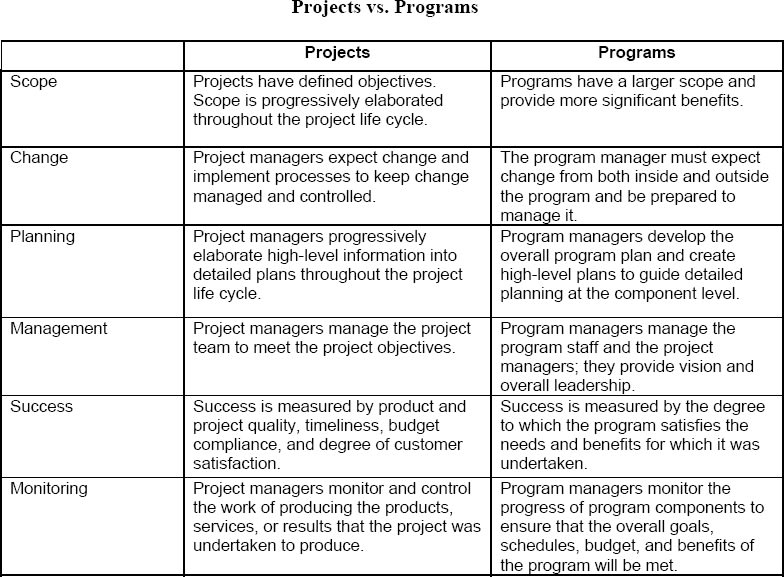
Program manager career guide: requirements and skills
The program manager is typically one of the senior managers in an organization, and the role requires considerable experience in managing complex projects. There’s a high demand for skilled program managers, as our search shows. We found over 5k program manager jobs on Indeed, and over 66K jobs on LinkedIn, as of December 2020. The average base salary for program managers is $58,804, with IT program managers earning up to $78K, according to Glassdoor.
With that in mind, let’s take a look at where program managers work, common educational and work experience requirements, and skills and attributes program managers must have.
Where do program managers work?
Any organization that may need a way to track and manage related projects may consider hiring a program manager. Program managers work in all types of sectors — healthcare, public services, technology companies, consultancies, SaaS, and e-commerce. While most program managers’ jobs are onsite, we also found a number of remote working opportunities for this role.
The title of a program manager may depend on the role and individual company. Some titles are fairly descriptive:
- Technical Program Manager
- Policy Program Manager
- Program Manager-Operations Excellence
- Foundation and CSR Program Manager.
In other cases, the titles may simply be Program Manager or Global Program Manager.
Lastly, this role generally reports to the executive level, C-suite employees, heads of departments, and higher-level managers/administrators in an organization.
What do employers look for when hiring program managers?
Here’s a quick checklist of what employers are likely to look for:
Work experience requirements
- 2 to 7 years of experience as a project manager. This includes the creation of project schedules, risk mitigation, escalation plans, and associated project materials.
- At least 2 years of work experience in the specific sector you’re applying to. For example, healthcare, social service, technology, and so on.
Educational qualifications
- Bachelor’s degree
- Certifications in project management (Project Management Professional (PMP®) Certification, Lean, Six Sigma).
- Some companies may also need a master’s in project management (MPM) degree or a master’s in business administration (MBA).
What are the responsibilities of a program manager?
What are some common responsibilities a program manager may have? Take a look:
- Brainstorm strategies for meeting business objectives
- Oversee budget and resources for different projects
- Manage coordination and communication between different departments and teams.
- Define governance for different programs and monitor compliance
- Discuss results and findings with the executive leadership
- Assess risks and take preventive and corrective measures
- Provide guidance to project managers
- Prepare detailed reports for the management
Pro tip: monday.com helps program managers excel at their job by keeping an eye on the big picture. Think quarterly goals, timelines, budgets, and KPIs.
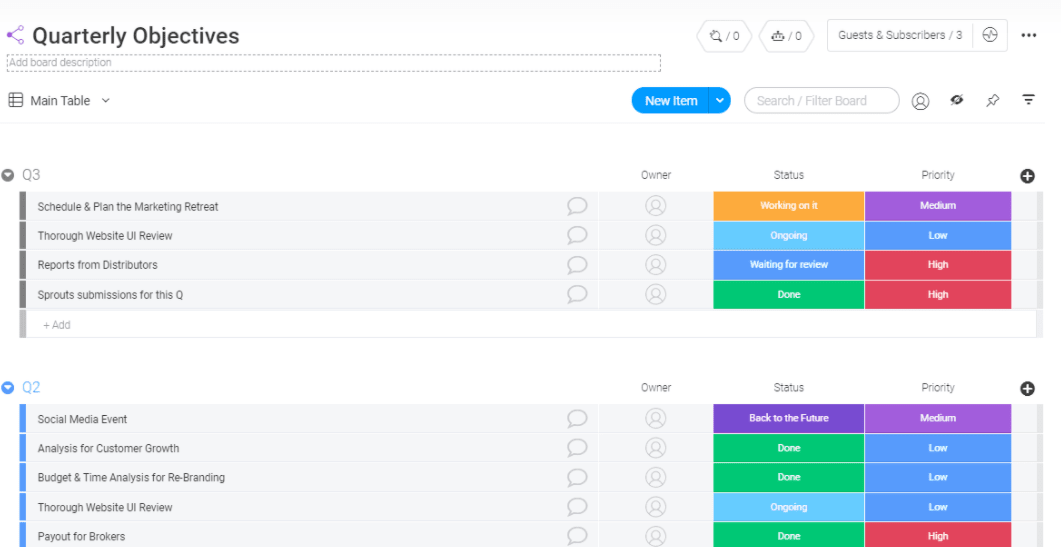
Key skills and attributes needed in program management
The best program managers are empathetic, analytical, and experts at seeing the big picture.
Here are some key skills and qualities employers look for:
- Interpersonal and communication skills
- Leadership qualities
- Strong analytical and finance skills
- Ability to break down complex inputs from senior leaders into actionable insights
- Ability to mitigate risk
- Organization and planning skills
- Ability to learn and adapt to project management tools and processes
3 tips for program manager success
Becoming a great program manager isn’t a matter of checking off a few job requirements. To excel in this advanced role, you’ll need to learn a few tricks of the trade.
Here are three important tips to ace your program management goals:
1. Focus on the big picture
As a program manager, you will need to learn to “zoom out” from some of the more knitty-gritty details that a project manager owns. One of the biggest changes you’ll undergo as a program manager is the way you track and measure progress, for yourself and your team. Think monthly timelines, not daily goals. Track budgets and resources, not individual deadlines.
A robust project management solution, such as monday.com, can make this transition even easier.
As a recent survey found, project management platforms help improve workload visibility, and resource forecasting, and keep projects within the budget. Take a look at some monday.com features that are game-changers for program managers.
The timeline and calendar views help program managers plan different projects in a visual way.
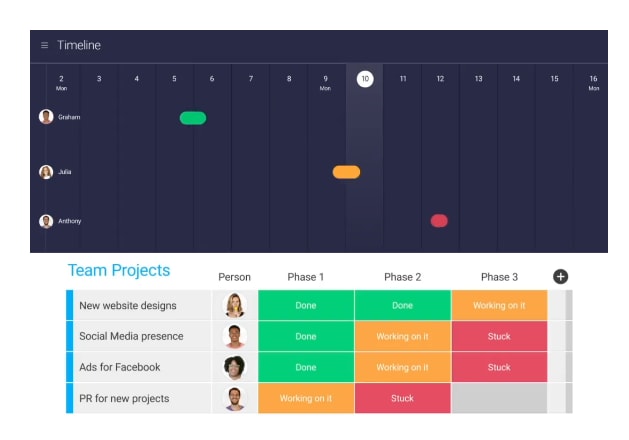
The Workload view allows them to see what each team has on its plate.
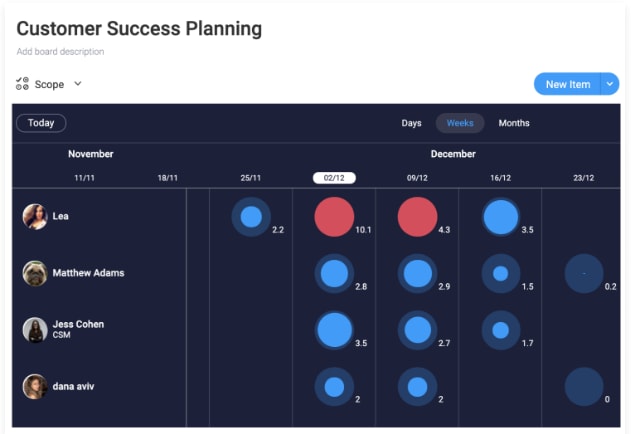
Custom reports help program managers make sense of budgets, KPIs, and progress.
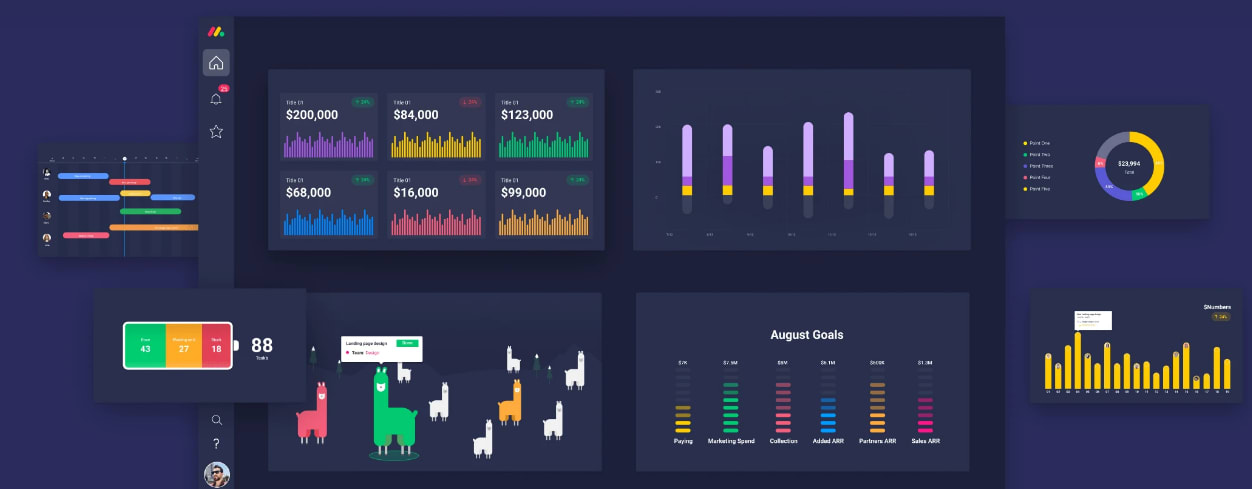
2. Emphasize communication
As a program manager, a core function of your job is communicating, most often with two specific groups — project managers and senior management. And it’s not something to be overlooked. An alarming 70% of employees feel overwhelmed because of broken communication methods and fragmented information. You don’t want your team to feature in that number.
To avoid chaos, you’ll always want set clear goals, and define roles and responsibilities with care. The next step is being smart about how you share this information with stakeholders and provide updates. Most seasoned program managers rely on work management platforms like monday.com that make it easy to centralize your actual work and communication in one place.
For senior management, proactive communication is more than a nice-to-have.
As Pedro Álvarez-Tabío Togores, Engineering Manager at Stride says, “When you communicate proactively, you’re giving your leaders up the chain of command the gift of choice: to act on that information, to store that information as notes, or just not do anything with it.”
Quick tip about getting your boss’ attention: the channel you use to send updates is as important as the message itself. Whether your boss prefers emails, Slack, phone, or simply a face-to-face meeting, be sure to deliver your updates accordingly.
3. Delegate effectively
You can’t do all the high-level thinking and strategizing program managers need to do if you insist on doing your project managers’ jobs. So, what should you do instead?
“Build structures and processes that don’t depend on you and ideally don’t need you,” says Adam Pisoni, former CTO at Yammer.
He also provides a few helpful tips on delegating work effectively:
- Set up central resources that outline roles and responsibilities. This should clearly define goals for your team, and be reviewed regularly to ensure everyone is on the same page.
- Meet regularly with all teams. Instead of micromanaging, let this meeting serve as a check on your team’s progress and areas where they need help.
- Have retrospectives. These help teams identify what went wrong with a project and how to improve.
monday workdocs and boards make it easy to schedule meetings, track key information, and share it for review.
Increase your productivity tenfold with monday.com’s project management solution
We may be biased, but research proves it too. In one study, 65% of respondents said monday.com helped complete projects on time, and 57% said it improved the quality of the final product.
You’ve already seen how monday.com’s multiple project views and reports can help you power your program management ship.
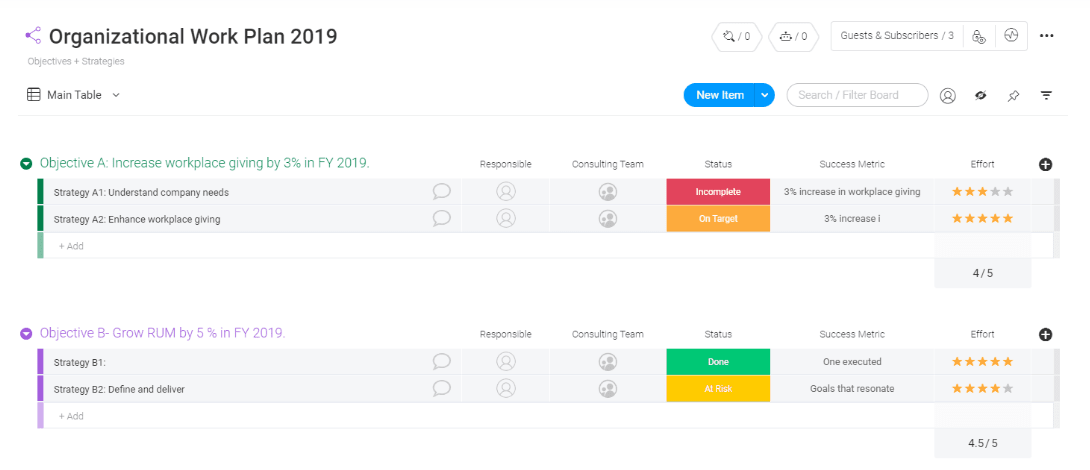
But here’s an actual story of how monday.com helped a company improve its program management efforts and collaboration. Genpact, a professional services firm, runs multiple programs for different industries and services. Each of these programs has multiple large-scale marketing campaigns.
Every time they decide on a go-to-market strategy for a client, they need to involve various teams in the execution process. This is similar to how program managers work with different teams on different projects. Genpact’s problem? Tracking and managing campaigns as a large, distributed team.
Their AVP of marketing, Sarah Pharr, shares, “There was no single source of truth or central repository that kept track of the status, progression, and key metrics surrounding our marketing campaigns.”
Enter monday.com. The team not only loved its user-friendly interface but also made their life simpler.
Here are some things monday.com helped them do:
- Track campaigns and activations against deadlines
- Identify trends and bottlenecks
- Get complete visibility of each team’s workload and capacity
- Set up a high-level GTM calendar that shows programs, campaigns, and activations across the entire organization
- Streamline processes for submitting new campaigns and creative briefs
All in all, the team saw a 20-30% reduction in emails the team sent, and a 40% improvement on cross-team collaboration.
Excited to see what monday.com can help you achieve as a program manager? We’ve got 3 handy templates to get you started:
Optimized planning for program managers
Taking the next step in your career is always scary, but also exciting. We hope this guide serves as a good introduction to the program manager role and the responsibilities it entails. As with all jobs, you’ll only know the full scope of your work once you roll up your sleeves and do it.
Having said that, there are ways to prepare yourself to be a successful program manager. Communicate often, delegate well, and most of all, make the switch from micro to macro planning. As we’ve seen, a platform such as monday.com can be incredibly helpful in doing this.
Want to see for yourself? Take monday.com for a test drive for two weeks, for free.

